Share some useful Redis visualization tools
This article summarizes several useful Redis visualization tools for everyone. I think they are quite good. Now I share them with you and give them a reference. I hope it will be helpful to everyone!
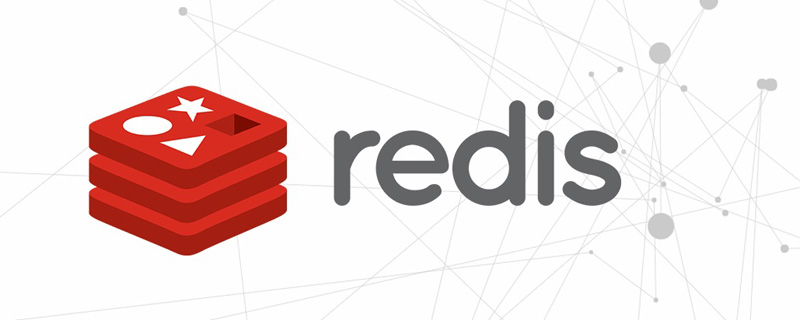
Without further ado, let’s get started!
1. Command line
1.1, iredis
Use iredis, use | to use other methods of redis through pipe and shell Tools, such as jq/fx/rg/sort/uniq/cut/sed/awk etc. for processing. It can also auto-complete, highlight, and have many functions. [Related recommendations: Redis video tutorial]
Official website address
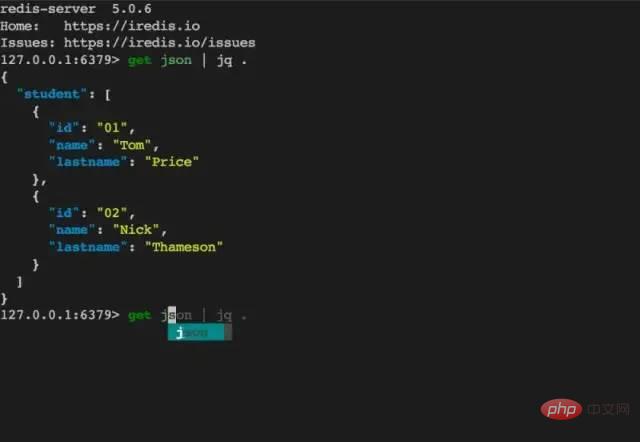
2. Visualization tools
2.1, Desktop client version
2.1.1, Redis Desktop Manager
This tool should be the most widely used visualization tool now. It has been around for a long time. It went through several iterations. Cross-platform support. It used to be free, but now it's a paid tool. The trial can last for half a month. Official website address
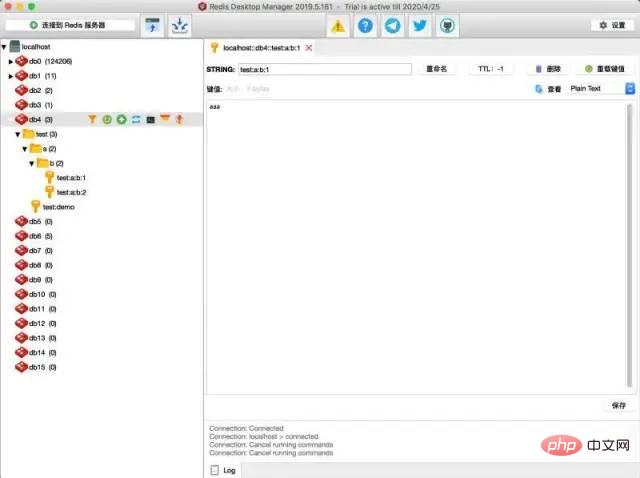
Review:
I used it before and thought the function was okay, but the interface UI was a bit ugly. I recently downloaded the latest version, and I feel that after such a long period of iteration, the interface looks okay. All the functions are available. The interface looks relatively simple and has full functions.
The display of key can support the key name space separated by colon. In addition to the five basic data types, it also supports the new Stream data type of redis 5.0. In terms of value display. Supports up to 9 data display methods.
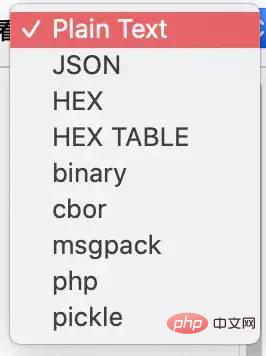
#The command line mode has also made great progress compared to before, supporting automatic command prompts.

The functions look quite satisfactory and easy to use. The biggest drawback is that it's not free. For personal use, it costs about 200 RMB a year.
2.1.2, medis
The redis visualization tool I use most at this stage. The interface matches personal aesthetics. The layout is simple. Cross-platform support, the key is free. Official website address
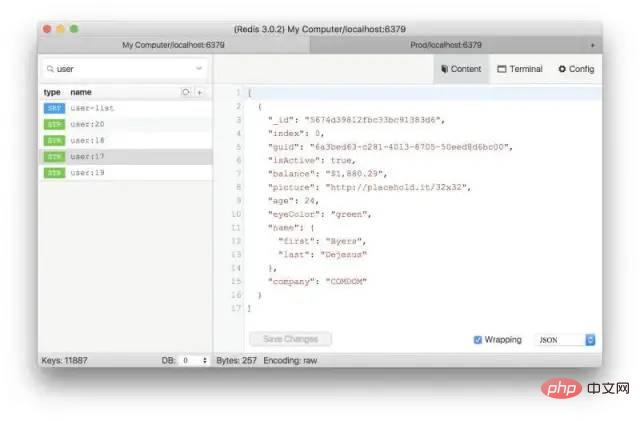
Review:
The appearance is quite good, and the functions meet the requirements of daily use. Keys are identified by brightly colored icons. It is very convenient to search for keys. It can fuzzy search to find matching keys and perform progressive scan without obvious lag. The search experience is quite good.
The disadvantage is that it does not support key namespace display, does not support the stream data type of redis 5.0, the command line is relatively simple, and does not support automatic matching and prompts. There are only three supported value display methods

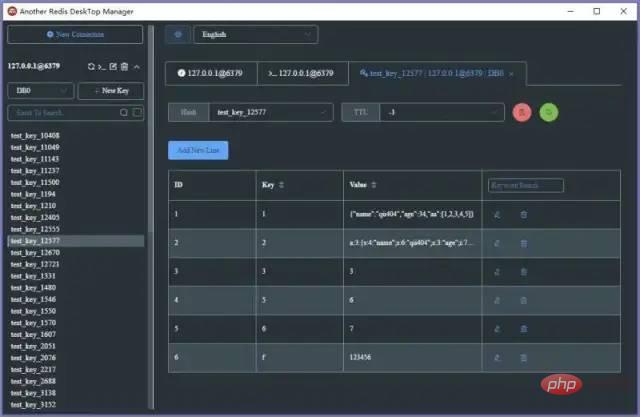
Review:
A very satisfactory free redis visualization tool with basic functions. Supports stream data type. It has monitoring statistics, supports dark themes, and supports the addition of clusters. The disadvantage is that there are no highlights, the UI is very simple, and the command line mode is relatively simple. However, the author is also constantly updating and optimizing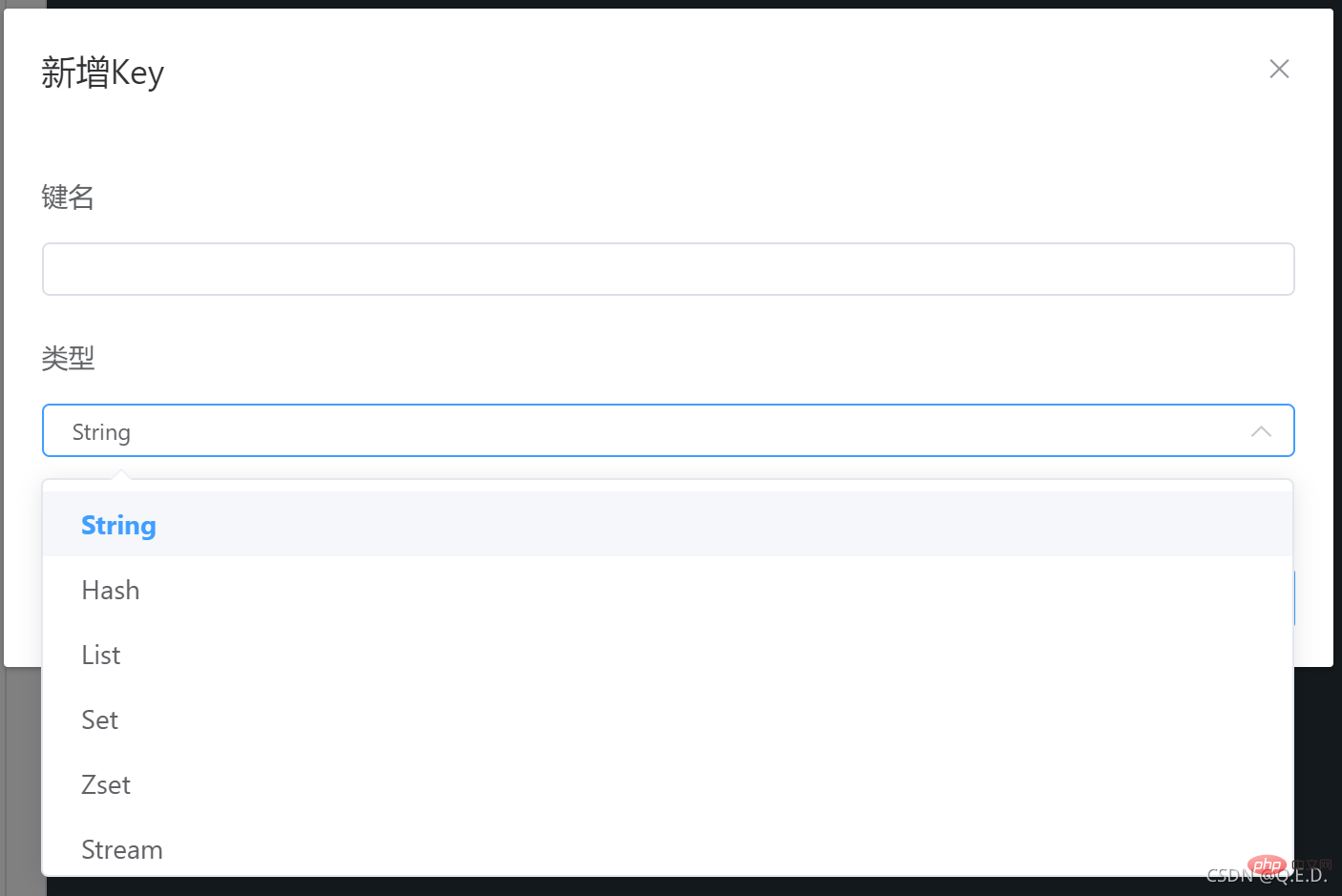
FastoRedis
FastoRedis has not been heard before. Then I went to experience it. To use this tool, you must first go to the official website to register an account. This software is a paid software. Although it is cross-platform, the trial period is only one day. Official website address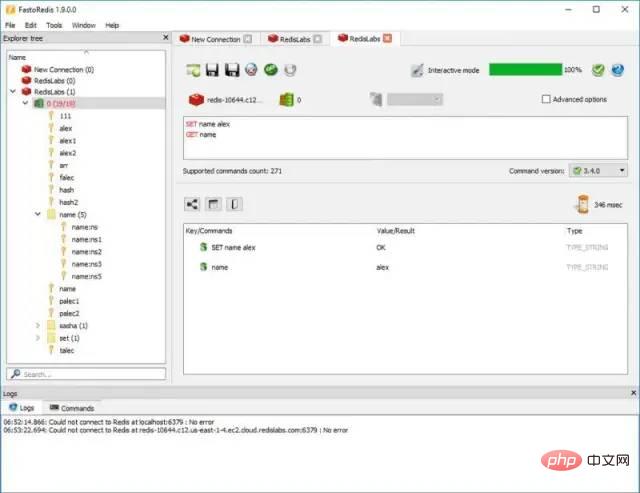
Review:
is a paid software after all. Although the interface has a strong Windows style, it seems a bit... Like redis desktop manager, but in terms of functionality. It's really good. It supports cluster mode and sentinel mode, key namespace display, and the stream data type of redis 5.0 is also supported. Command line mode supports automatic prompt completion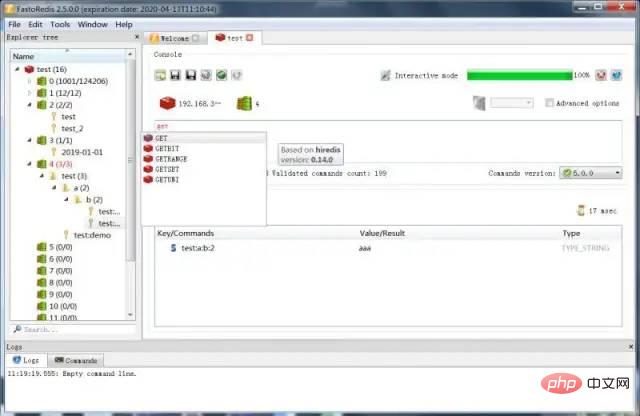
The display of value supports tree-like, table-like and other display modes. To my surprise, the value object supports up to 17 rendering methods
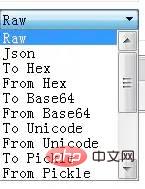
In general, in addition to the slightly stiff interface UI interaction, it is also a paid software. In addition, it is also a very good redis visualization tool.
2.1.5, RedisPlus
An open source free desktop client software. Official website address
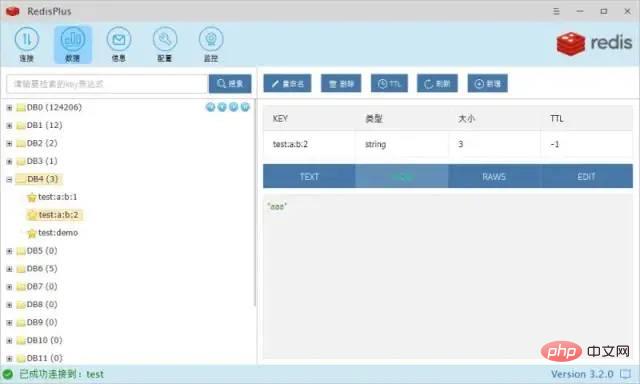
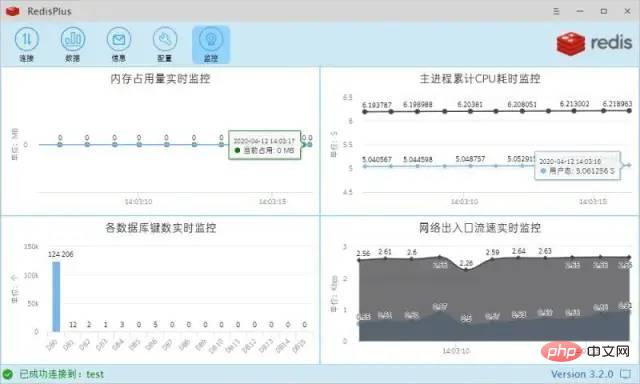
Review:
There are no highlights, just basic functions. A bonus might be having a monitor. Others are very ordinary. Even this software does not even have a command line mode. It was developed using javafx. Logically speaking, it should be a cross-platform software, but the download address provided does not have a direct installation package for mac. Besides, even if it is cross-platform.
2.1.6, Red
This is a redis visualization tool downloaded from the Apple app store. Mac users can go to the app store and search
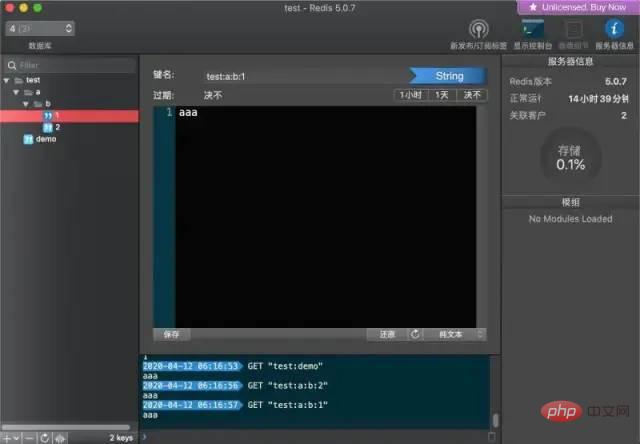
Review:
only supports the Mac version, and it looks pretty good. The functionality is mediocre. It has basic functions and supports display of key namespace.
2.1.7, Redis Assistant
For details, please refer to this guy’s blog post==》Portal
2.2, web version
2.2.1, Redis Insight
This software has a great background. It is a redis visualization tool at the monitoring and analysis level produced by redis labs. This software is a web version.
What kind of company is redis labs? redis labs was founded in 2011. The company is committed to providing cloud hosting services for popular NoSQL open source databases such as Redis and Memcached. It can be regarded as a professional company dedicated to redis cloud. In the software they provide, in addition to connecting to the enterprise's private redis service, it can also connect to their redis cloud. Official website address
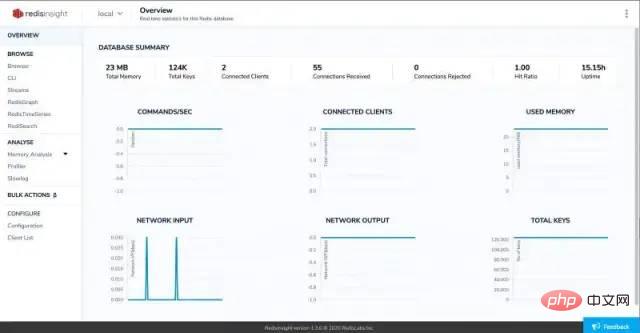
Review:
Although it is a web version, this software surpasses my understanding of redis visualization tools. The interface feels very professional and does not look like an open source product developed by an individual. I found that key query and browsing are just a functional module here
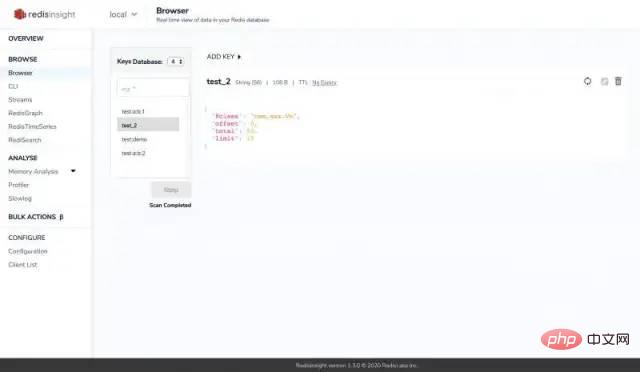
Command line aspect:
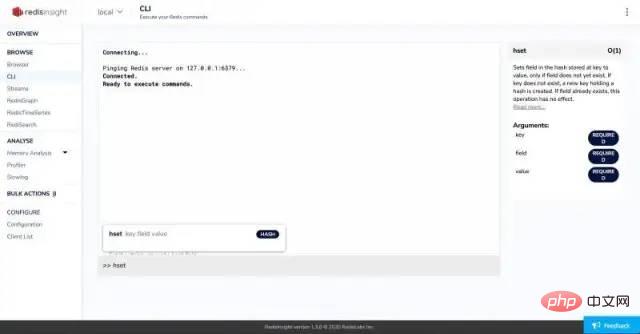
In addition to Command completion prompts, and documentation explanations of related commands are available on the right. How about it, is it super humane?
Also supports the Stream data type of redis 5.0
The following three functions require the installation of their other redis modules on the server side. They are queryable charts, redis time series display and full text query functions.
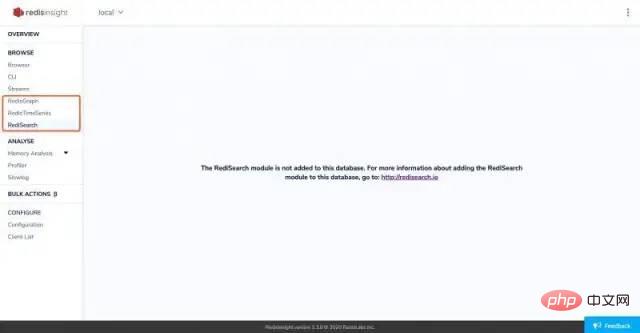
The most awesome thing is that redisInsight actually supports the analysis function of rdb. People who have some experience in analyzing the storage distribution of rdb will use rdb-tools to analyze it. And redisInsight actually integrates this. I used this before to analyze the RDB of the company's production environment and find out the reasons for the rapid growth of data volume. It is simply an artifact.
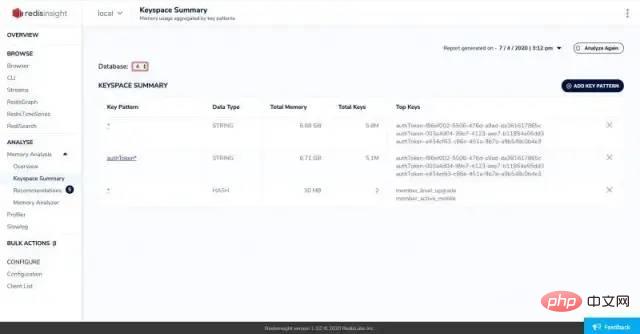
This is the result of the last time I used this software to analyze RDB. It is very clear which key occupies too much memory.
The Profiler in the analysis function can monitor all redis commands executed within a period of time, and Slowlog can display the redis commands that are executed slowly.
In addition, this software can also perform batch operations
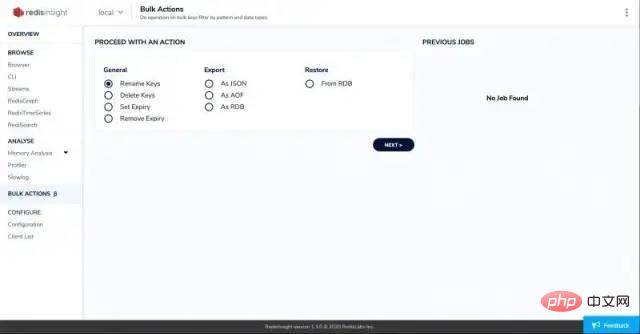
RedisInsight, a visual tool, has a staggeringly comprehensive coverage of redis. Although its key query function is not excellent, its comprehensiveness and analysis and monitoring are indeed beyond the reach of other redis visualization tools. Moreover, its appearance is so good, it is highly recommended.
2.3, IDE tool plugin
2.3.1, Iedis2
Iedis is a plug-in based on IntelliJ IDEA, in the IDEA plugin market You can search it here, but it is a paid plug-in. Available for 7 days trial
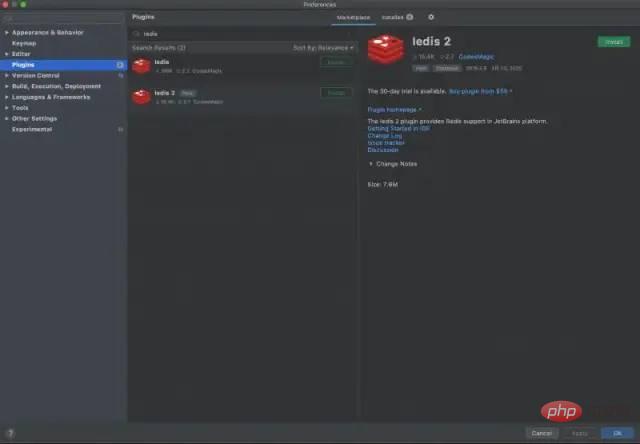
Evaluation:
As a plug-in for IDEA, it is of course cross-platform, its style is completely in compliance with IDEA, and its appearance is guaranteed. Functionally, Iedis is also unambiguous. There is basically nothing wrong with the basic query function. Coupled with IDEA's usage habits, you can use it easily without opening additional software. Switching between the code and plug-in windows can also improve efficiency
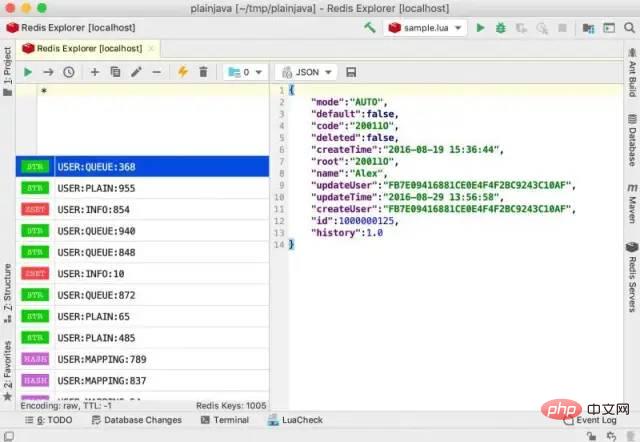
The biggest feature of this plug-in is that it can support the writing and debugging of Lua scripts, which has never been seen in other software. Arrived. In the past, I used Lua extensively for redis operations in a business. Although I enjoyed the atomicity and performance of redis Lua, it was a pain when writing and debugging. Because I couldn’t debug, I needed to return a value every time. Let's check what went wrong. Seeing this tool, I regret not discovering this plug-in earlier, and I am willing to pay
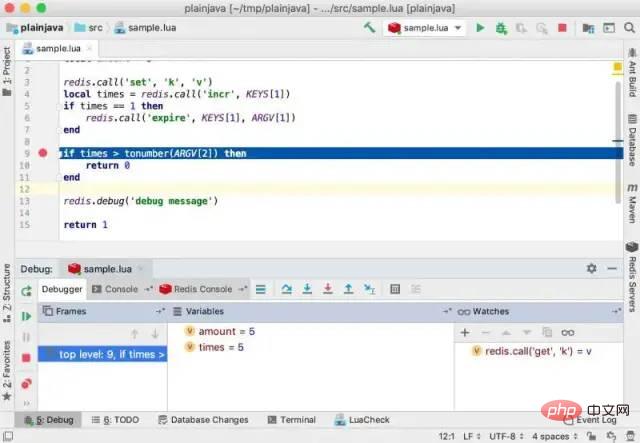
This plug-in also supports slow command viewing
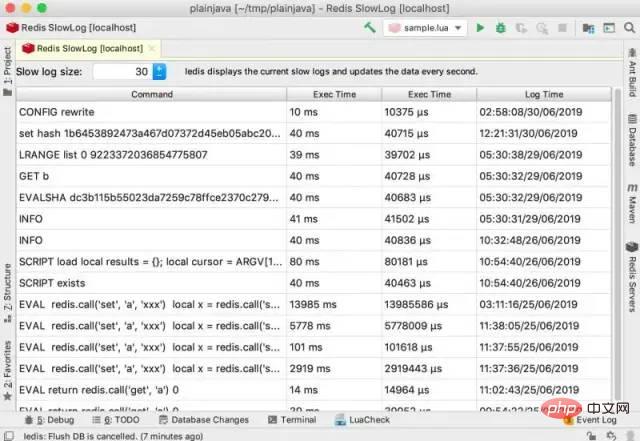
In general, except for the need to pay, everything else about Iedis looks great. price is. . . $139/year. It’s still US dollars. When you see this price, do you sigh?
3. Summary
Regarding the several redis visualization tools introduced earlier, I hope that everyone can choose good tools in daily development and solve them with the fastest efficiency. The most complicated thing.
Without further ado, the article is over, looking forward to the third series!
For more programming-related knowledge, please visit: Introduction to Programming! !
The above is the detailed content of Share some useful Redis visualization tools. For more information, please follow other related articles on the PHP Chinese website!

Hot AI Tools

Undresser.AI Undress
AI-powered app for creating realistic nude photos

AI Clothes Remover
Online AI tool for removing clothes from photos.

Undress AI Tool
Undress images for free

Clothoff.io
AI clothes remover

Video Face Swap
Swap faces in any video effortlessly with our completely free AI face swap tool!

Hot Article

Hot Tools

Notepad++7.3.1
Easy-to-use and free code editor

SublimeText3 Chinese version
Chinese version, very easy to use

Zend Studio 13.0.1
Powerful PHP integrated development environment

Dreamweaver CS6
Visual web development tools

SublimeText3 Mac version
God-level code editing software (SublimeText3)

Hot Topics
 1658
1658
 14
14
 1415
1415
 52
52
 1309
1309
 25
25
 1257
1257
 29
29
 1231
1231
 24
24
 How to build the redis cluster mode
Apr 10, 2025 pm 10:15 PM
How to build the redis cluster mode
Apr 10, 2025 pm 10:15 PM
Redis cluster mode deploys Redis instances to multiple servers through sharding, improving scalability and availability. The construction steps are as follows: Create odd Redis instances with different ports; Create 3 sentinel instances, monitor Redis instances and failover; configure sentinel configuration files, add monitoring Redis instance information and failover settings; configure Redis instance configuration files, enable cluster mode and specify the cluster information file path; create nodes.conf file, containing information of each Redis instance; start the cluster, execute the create command to create a cluster and specify the number of replicas; log in to the cluster to execute the CLUSTER INFO command to verify the cluster status; make
 How to clear redis data
Apr 10, 2025 pm 10:06 PM
How to clear redis data
Apr 10, 2025 pm 10:06 PM
How to clear Redis data: Use the FLUSHALL command to clear all key values. Use the FLUSHDB command to clear the key value of the currently selected database. Use SELECT to switch databases, and then use FLUSHDB to clear multiple databases. Use the DEL command to delete a specific key. Use the redis-cli tool to clear the data.
 How to read redis queue
Apr 10, 2025 pm 10:12 PM
How to read redis queue
Apr 10, 2025 pm 10:12 PM
To read a queue from Redis, you need to get the queue name, read the elements using the LPOP command, and process the empty queue. The specific steps are as follows: Get the queue name: name it with the prefix of "queue:" such as "queue:my-queue". Use the LPOP command: Eject the element from the head of the queue and return its value, such as LPOP queue:my-queue. Processing empty queues: If the queue is empty, LPOP returns nil, and you can check whether the queue exists before reading the element.
 How to configure Lua script execution time in centos redis
Apr 14, 2025 pm 02:12 PM
How to configure Lua script execution time in centos redis
Apr 14, 2025 pm 02:12 PM
On CentOS systems, you can limit the execution time of Lua scripts by modifying Redis configuration files or using Redis commands to prevent malicious scripts from consuming too much resources. Method 1: Modify the Redis configuration file and locate the Redis configuration file: The Redis configuration file is usually located in /etc/redis/redis.conf. Edit configuration file: Open the configuration file using a text editor (such as vi or nano): sudovi/etc/redis/redis.conf Set the Lua script execution time limit: Add or modify the following lines in the configuration file to set the maximum execution time of the Lua script (unit: milliseconds)
 How to use the redis command line
Apr 10, 2025 pm 10:18 PM
How to use the redis command line
Apr 10, 2025 pm 10:18 PM
Use the Redis command line tool (redis-cli) to manage and operate Redis through the following steps: Connect to the server, specify the address and port. Send commands to the server using the command name and parameters. Use the HELP command to view help information for a specific command. Use the QUIT command to exit the command line tool.
 How to implement redis counter
Apr 10, 2025 pm 10:21 PM
How to implement redis counter
Apr 10, 2025 pm 10:21 PM
Redis counter is a mechanism that uses Redis key-value pair storage to implement counting operations, including the following steps: creating counter keys, increasing counts, decreasing counts, resetting counts, and obtaining counts. The advantages of Redis counters include fast speed, high concurrency, durability and simplicity and ease of use. It can be used in scenarios such as user access counting, real-time metric tracking, game scores and rankings, and order processing counting.
 How to set the redis expiration policy
Apr 10, 2025 pm 10:03 PM
How to set the redis expiration policy
Apr 10, 2025 pm 10:03 PM
There are two types of Redis data expiration strategies: periodic deletion: periodic scan to delete the expired key, which can be set through expired-time-cap-remove-count and expired-time-cap-remove-delay parameters. Lazy Deletion: Check for deletion expired keys only when keys are read or written. They can be set through lazyfree-lazy-eviction, lazyfree-lazy-expire, lazyfree-lazy-user-del parameters.
 How to optimize the performance of debian readdir
Apr 13, 2025 am 08:48 AM
How to optimize the performance of debian readdir
Apr 13, 2025 am 08:48 AM
In Debian systems, readdir system calls are used to read directory contents. If its performance is not good, try the following optimization strategy: Simplify the number of directory files: Split large directories into multiple small directories as much as possible, reducing the number of items processed per readdir call. Enable directory content caching: build a cache mechanism, update the cache regularly or when directory content changes, and reduce frequent calls to readdir. Memory caches (such as Memcached or Redis) or local caches (such as files or databases) can be considered. Adopt efficient data structure: If you implement directory traversal by yourself, select more efficient data structures (such as hash tables instead of linear search) to store and access directory information




